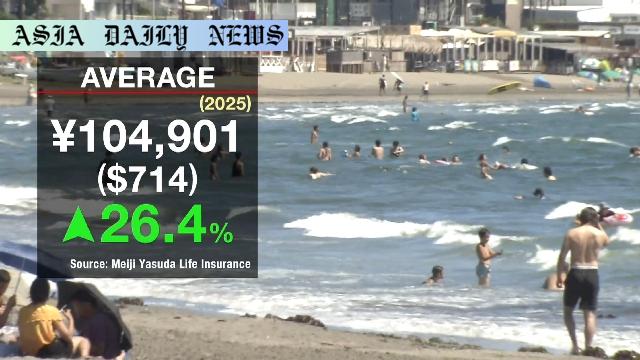Summer Spending: Japan’s summer vacation budgets hit a record high of over 100,000 yen, but economic challenges reveal stark disparities.

Summer Spending Trends Soar Amid Economic Recovery
As Japan emerges from years of economic challenges, a new survey conducted by Meiji Yasuda has revealed a landmark shift in summer vacation spending. With the average household budget for summer holidays surging to an impressive 105,000 yen (over $710 USD), this marks a 26.4% increase from last year. It is the first time since 2006 that budgets have crossed this threshold, reflecting both optimism towards post-pandemic recoveries and rising wages. The increase marks the fourth consecutive year of growth in summer spending, underscoring the nation’s growing appetite for leisure and travel.
This rise in vacation budgets is largely attributed to heightened travel enthusiasm, as travelers seek to explore destinations domestically and globally after years of restrictions. Almost 75% of survey respondents revealed that their primary reason for spending more this summer is travel. Additionally, higher incomes contributed to these trends, with over a quarter of participants citing salary increases as a reason for expanding their budgets.
Disparity in Household Budgets Amid Economic Challenges
While there’s plenty to celebrate with record-breaking budgets, the report also hints at deepening financial inequalities. A significant 18.3% of survey participants said they are cutting down on expenditures. The majority cited sustained economic inflation as the primary reason for shrinking household budgets. Over 60% of respondents said soaring prices had forced them to tighten their belts, while 24% expressed concerns regarding financial uncertainty, leading them to save instead of splurging.
This dual narrative of increased spending for some and tighter budgets for others highlights the economic challenges the nation still faces. Even as rising wages and greater opportunities for travel spark optimism, the specter of inflation continues to affect a sizable segment of the population.
Forecasting the Impact of Soaring Prices
The mixed responses in the survey once again underline the delicate balancing act expected in Japan’s struggle towards sustained economic recovery. With approximately one in five households indicating their intention to spend less during the summer months, the tension between inflation and personal financial stability comes into sharper focus. However, for many households raising their budgets, the drive towards experiences such as travel remains a promising indicator for certain business sectors, including tourism and hospitality.
The data revealed by Meiji Yasuda gives us a glimpse into how consumers are prioritizing happiness and leisure while simultaneously grappling with uncertainties. Policymakers will need to focus on broader economic stabilizers to ensure that financial gaps do not widen further in the coming years.
The Road Ahead for Summer Spending in Japan
Looking ahead, stakeholders in Japan will need to tackle these economic disparities head-on to ensure sustainable consumer confidence. With inflation and rising costs looming as major challenges, achieving an equitable growth model where more citizens can take part in celebratory spending remains a critical priority.
Conclusion
In summary, Japan’s summer spending this year serves as both a cause for celebration and a cautionary tale. The rise in household vacation budgets of over 105,000 yen demonstrates not only the country’s growing resilience but also the underlying pain points of inequality and uncertainty at a personal financial level. For businesses and policymakers alike, the divergent trends – optimism among some and restraint among others – underscore the careful balance that economic strategies need to strike in the years ahead.
Commentary
Japan’s Spending Surge: Shades of Optimism and Challenges
News of Japan’s record-breaking summer spending highlights an exciting shift for the post-pandemic economy. Travel plans are soaring, household budgets are expanding, and industries such as tourism and retail certainly have much to look forward to. After enduring the prolonged effects of COVID-19, perhaps it is about time people prioritized joy, travel, and new experiences.
However, this celebratory aspect coexists uncomfortably alongside concerns over inflation and broader economic uncertainty. While the report shows a notable percentage of people spending more, the fact that another significant group – 18.3% – is scaling back due to financial pressures is a crucial consideration. Elevated prices of goods and services and unpredictable economic trends are burdens that many still carry today.
Global Parallels and Insights
The trends observed in Japan are not isolated, as they reflect global economic patterns this year. Nations across the globe have been grappling with post-pandemic inflation, where recovery is frequently unevenly distributed. Japan’s current situation serves as a microcosm of these larger trends, providing a valuable lens for understanding the interplay of financial behavior, desires, and global economic recovery. For governments worldwide, Japan’s story underscores the need to pay attention not only to metrics like growth and rebound percentages but also to the tangible human issues such as inequality.
A Balanced Path Forward
Ultimately, while this news report reflects hope and resilience in terms of leisure spending, it also reminds us that challenges persist for many. Policymakers and industries must focus on addressing inflationary pressures and ensuring equitable growth. Advocating for financial stability alongside shared prosperity can help more individuals and families partake in summer vacations or any other milestones worth celebrating. As Japan’s summer kicks off, let us celebrate progress while keeping a watchful eye on addressing disparities.


